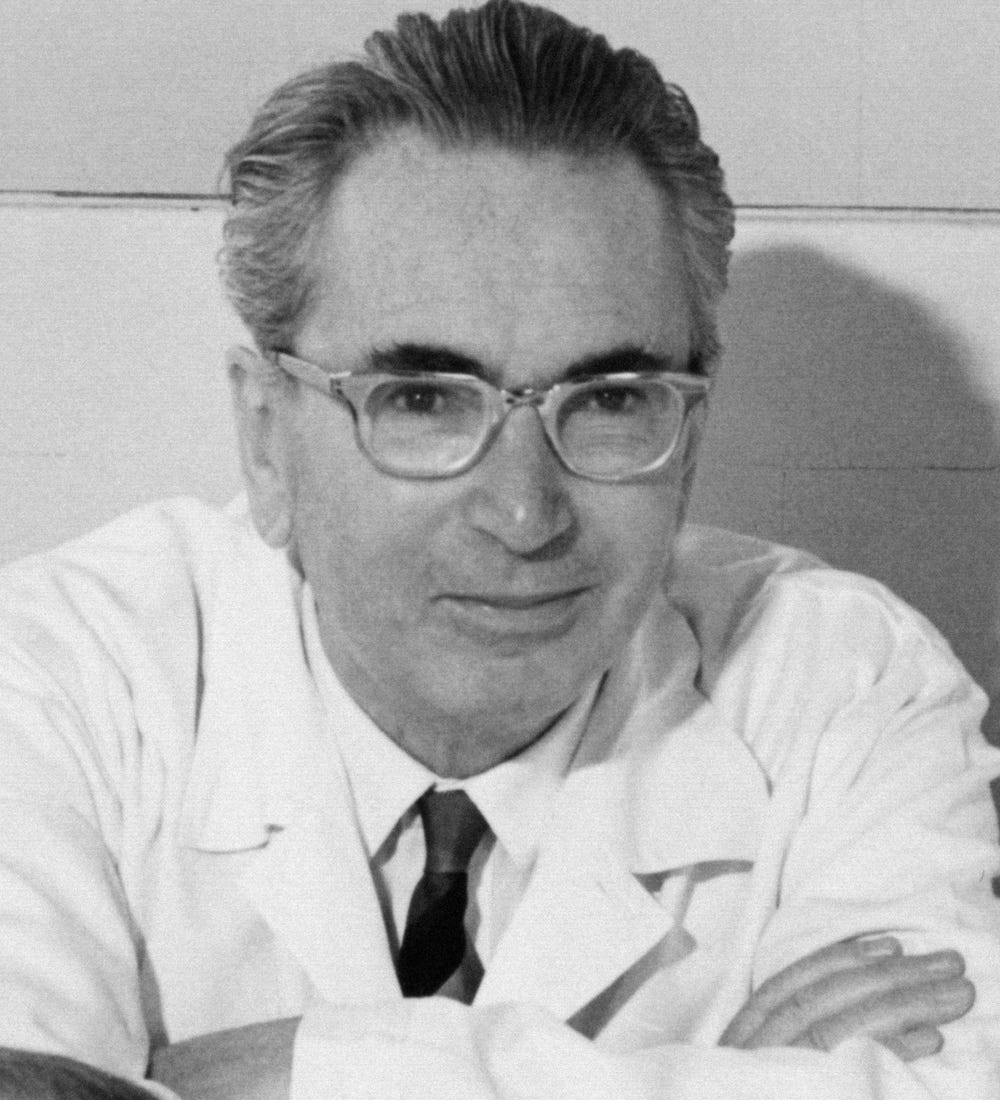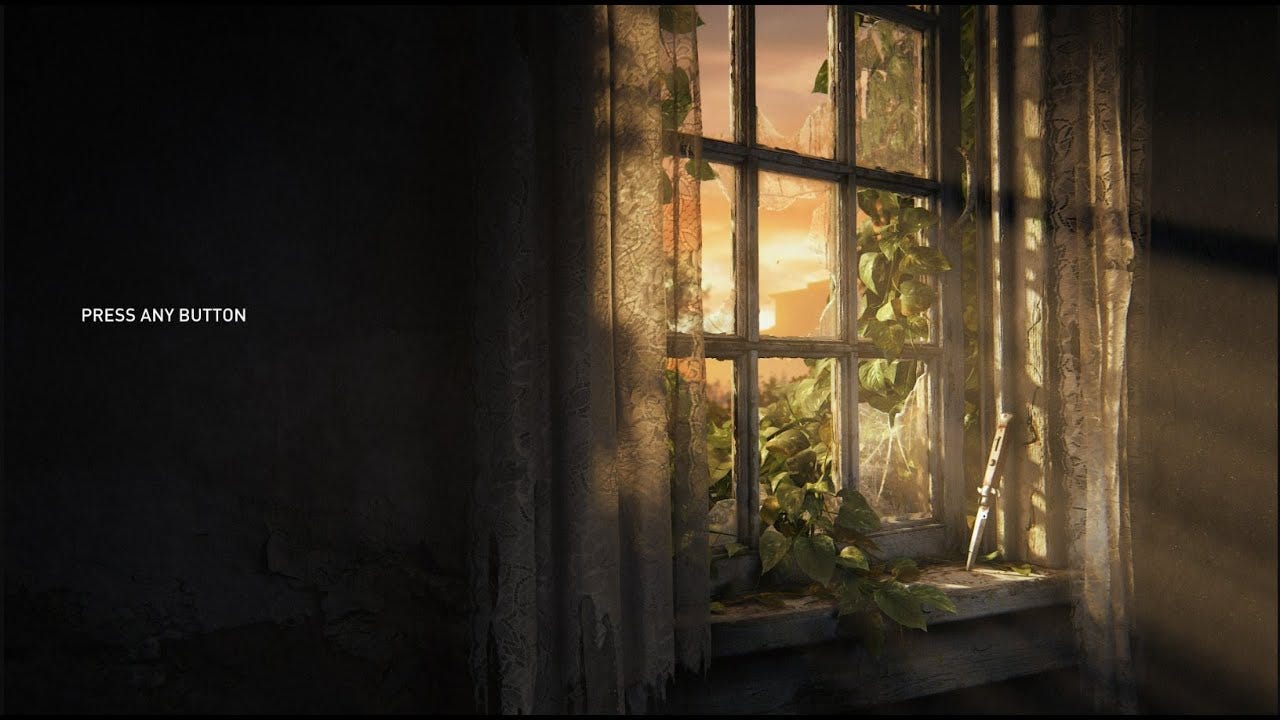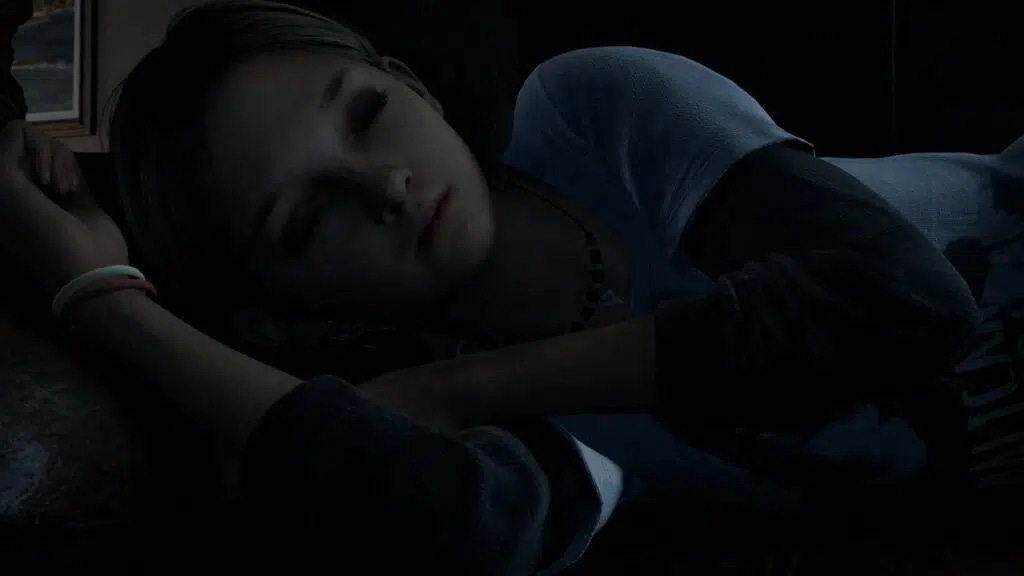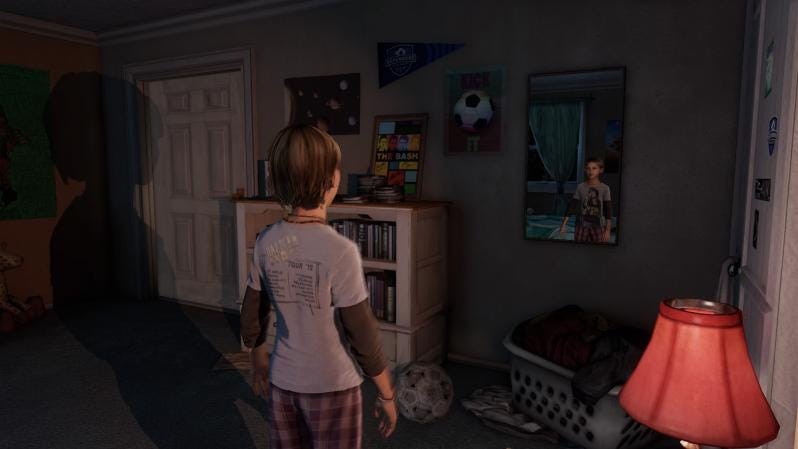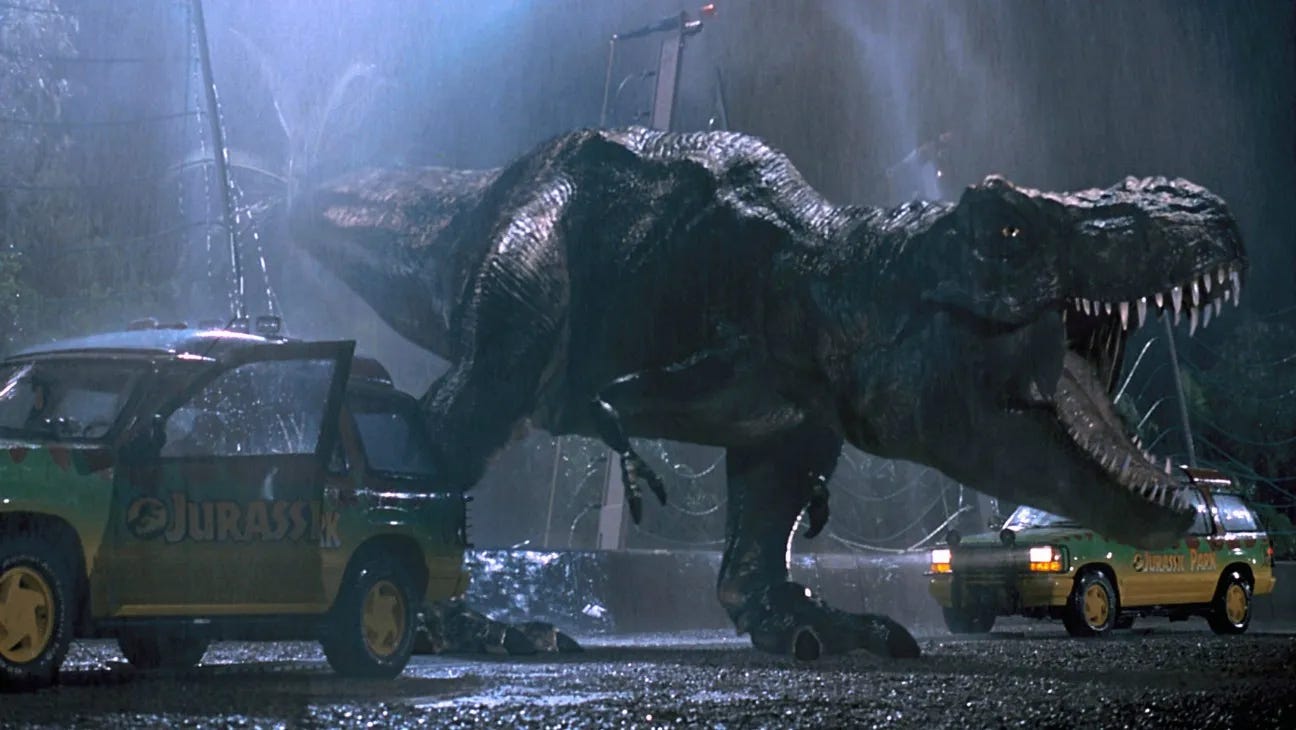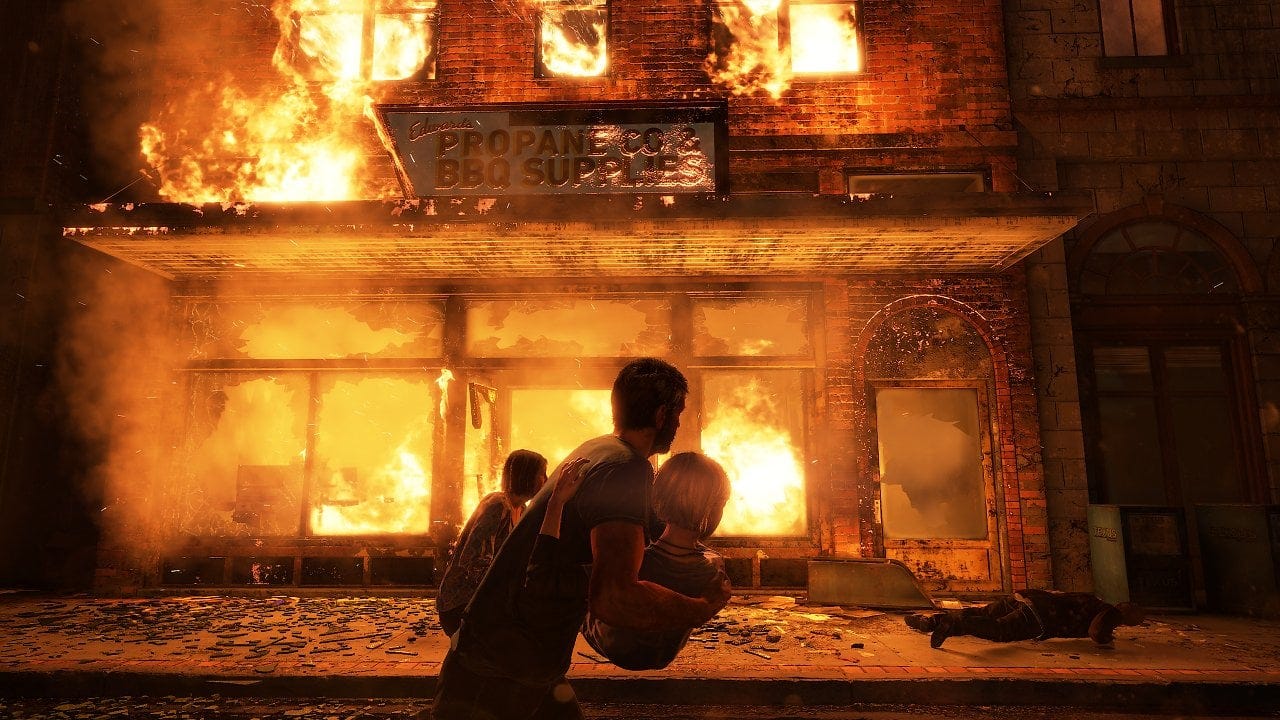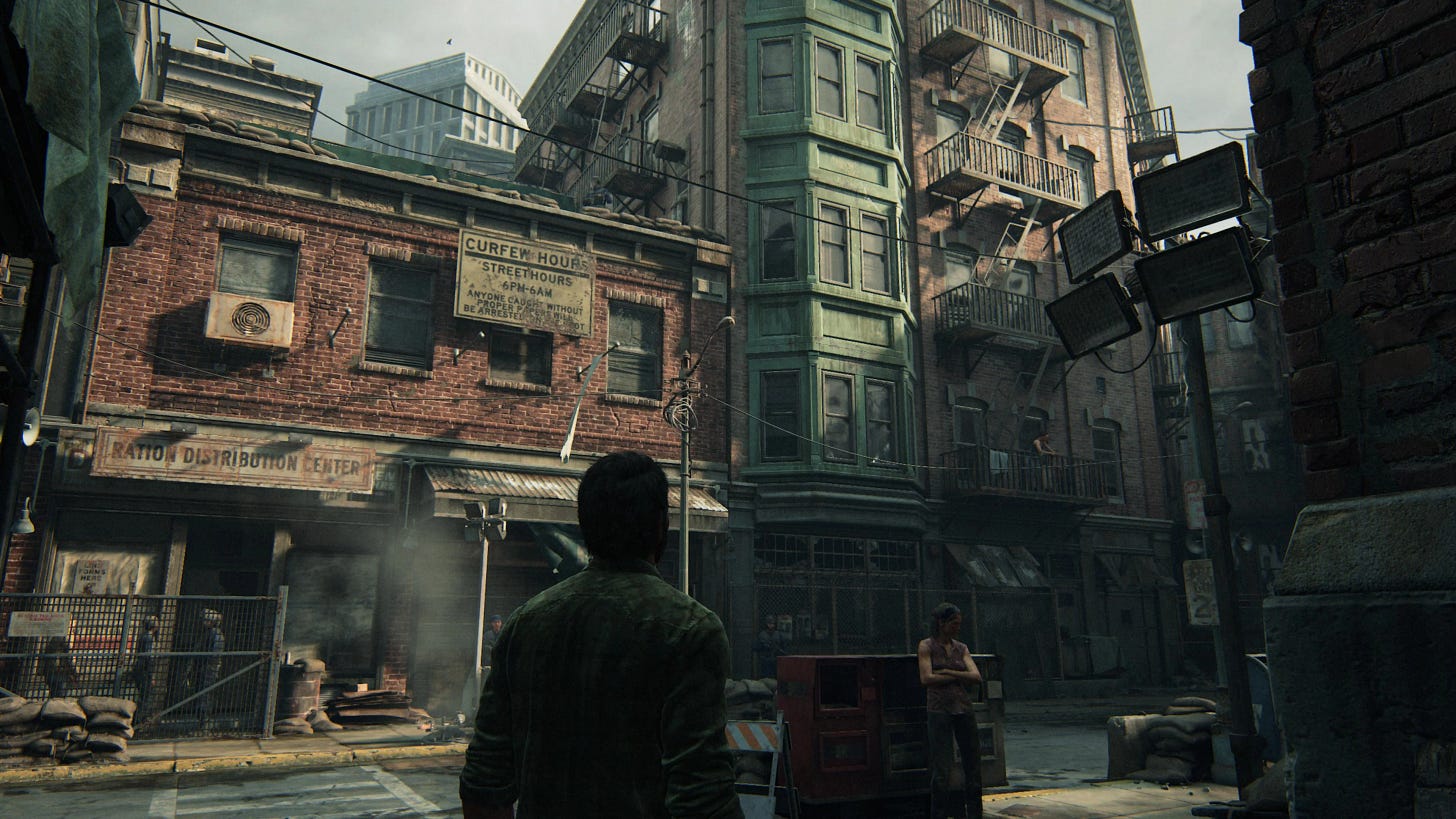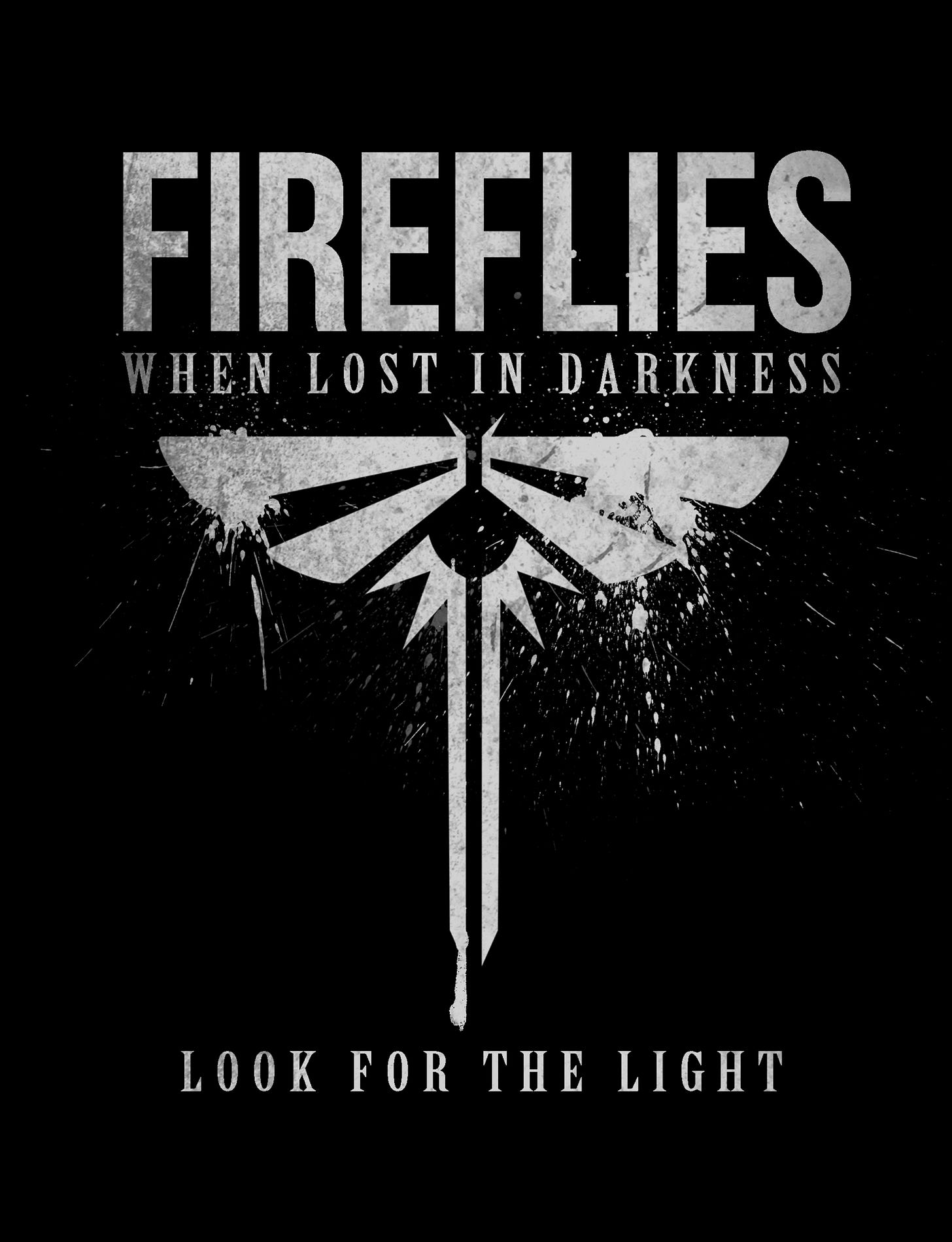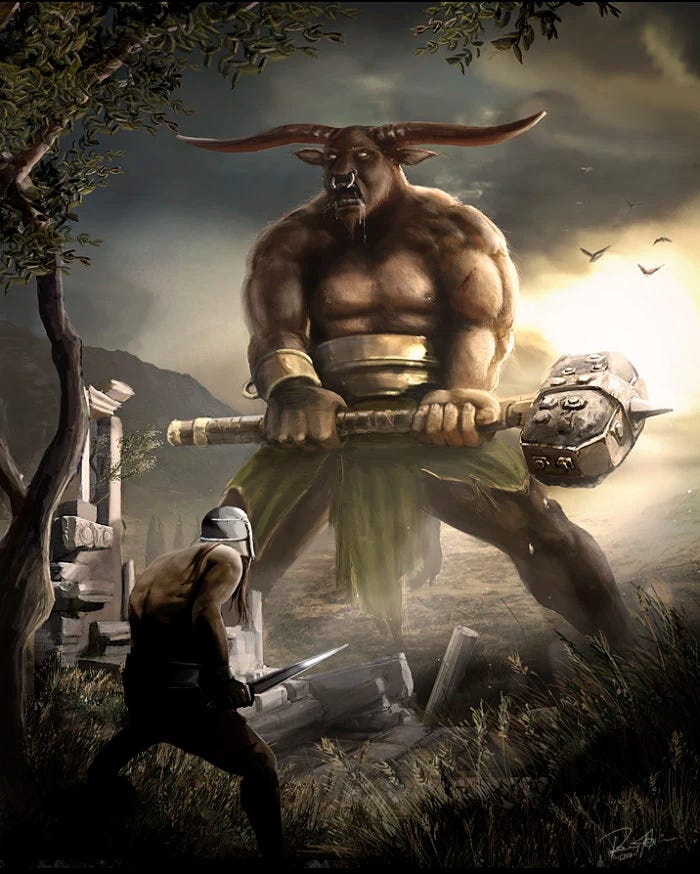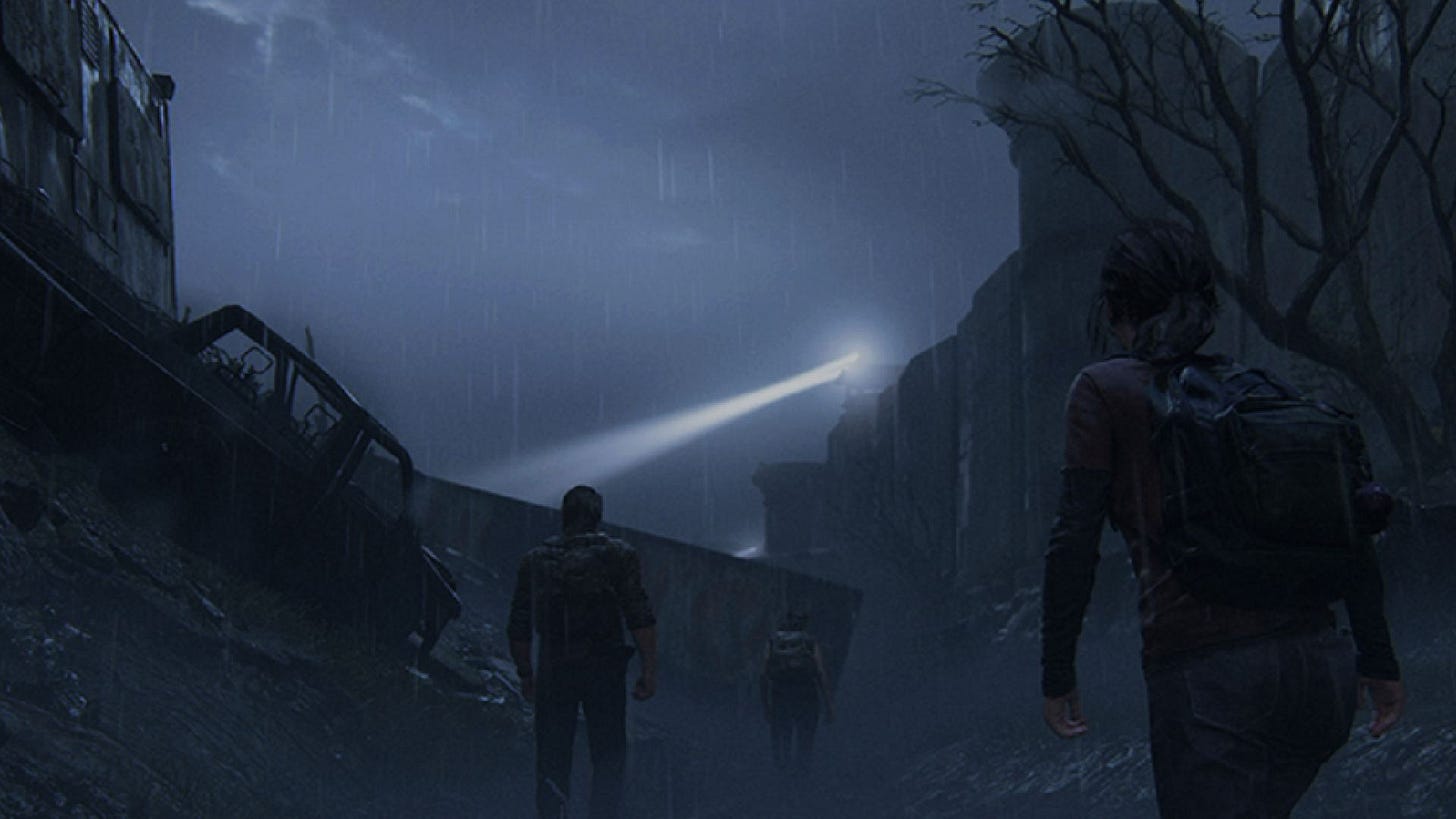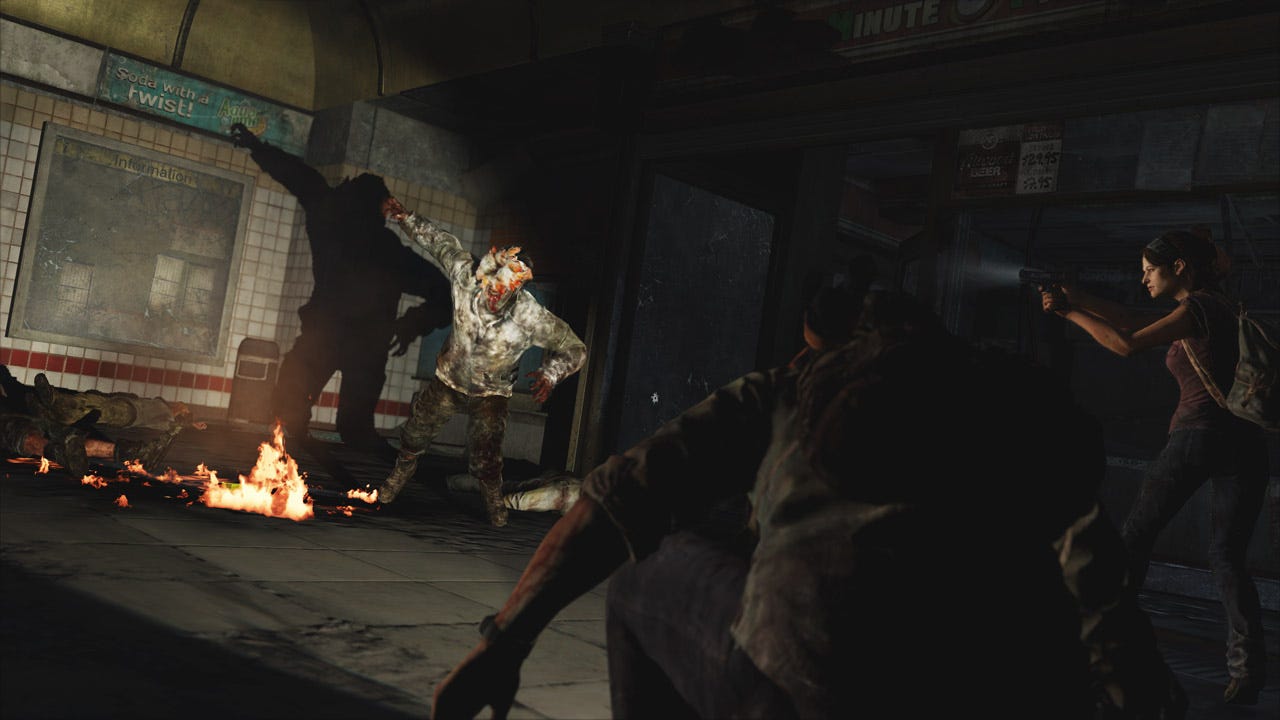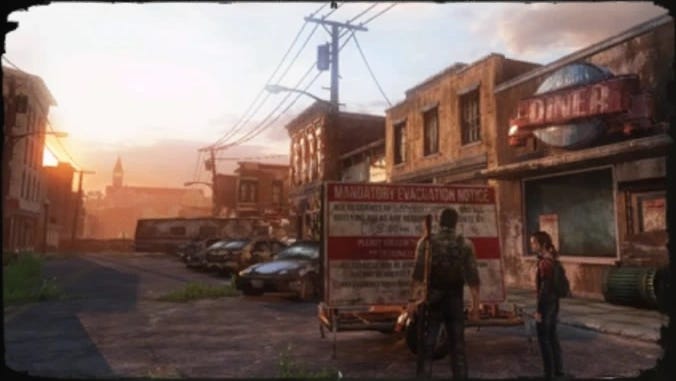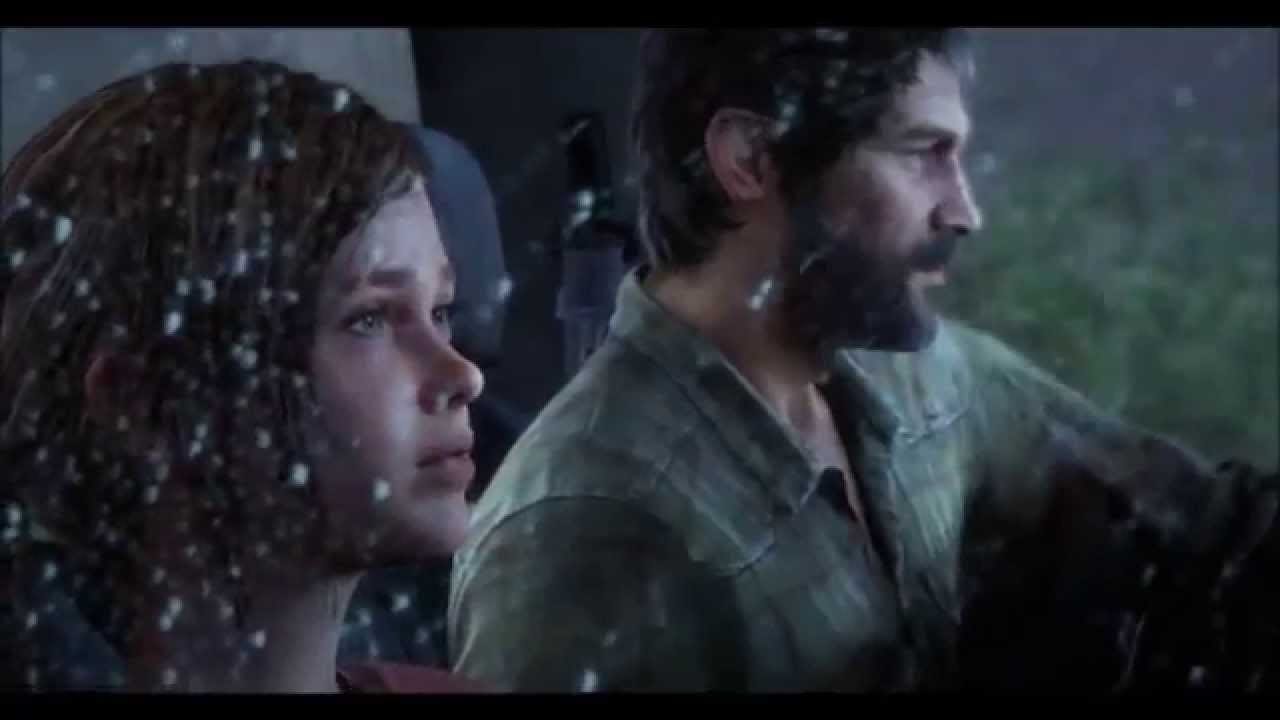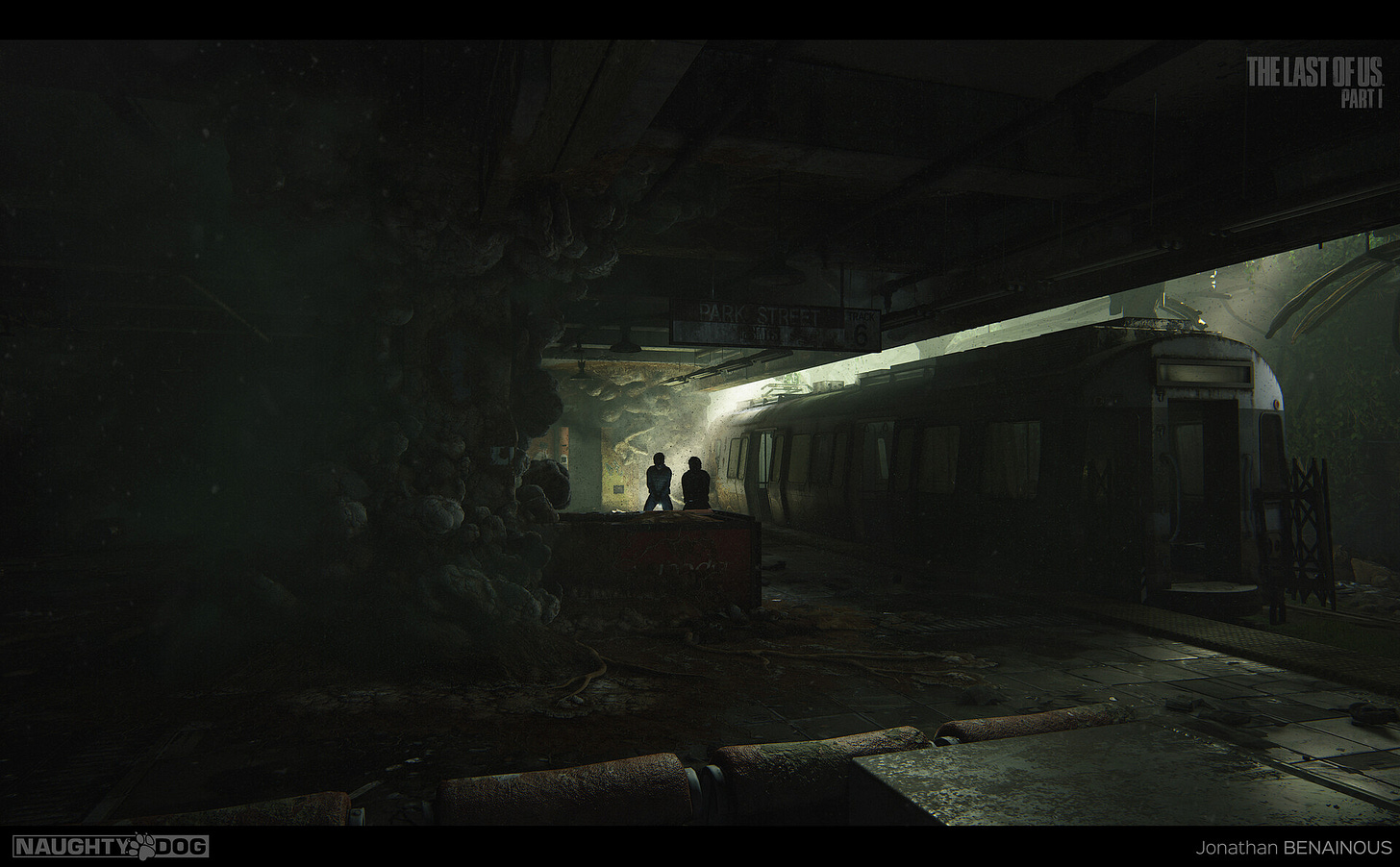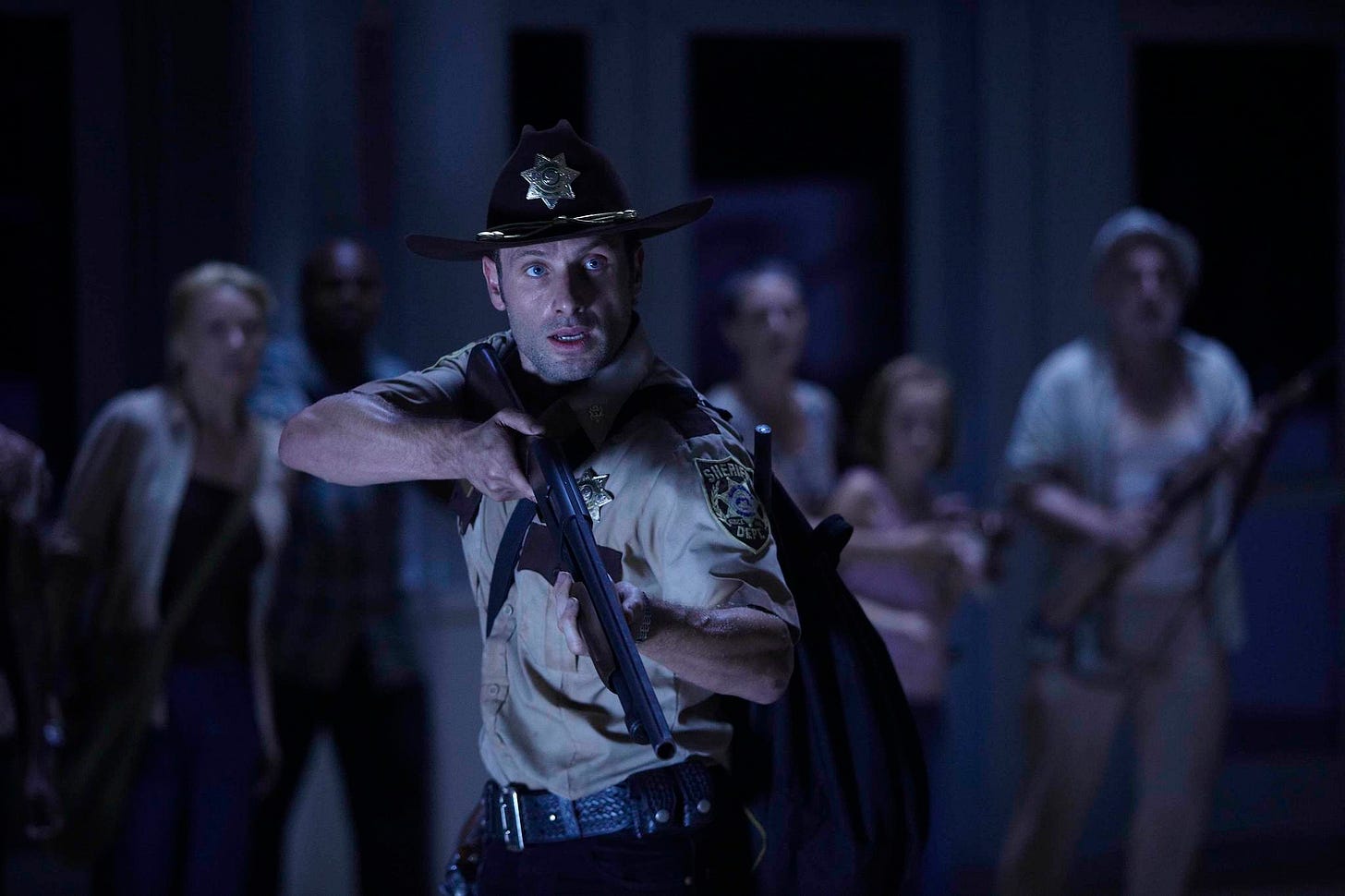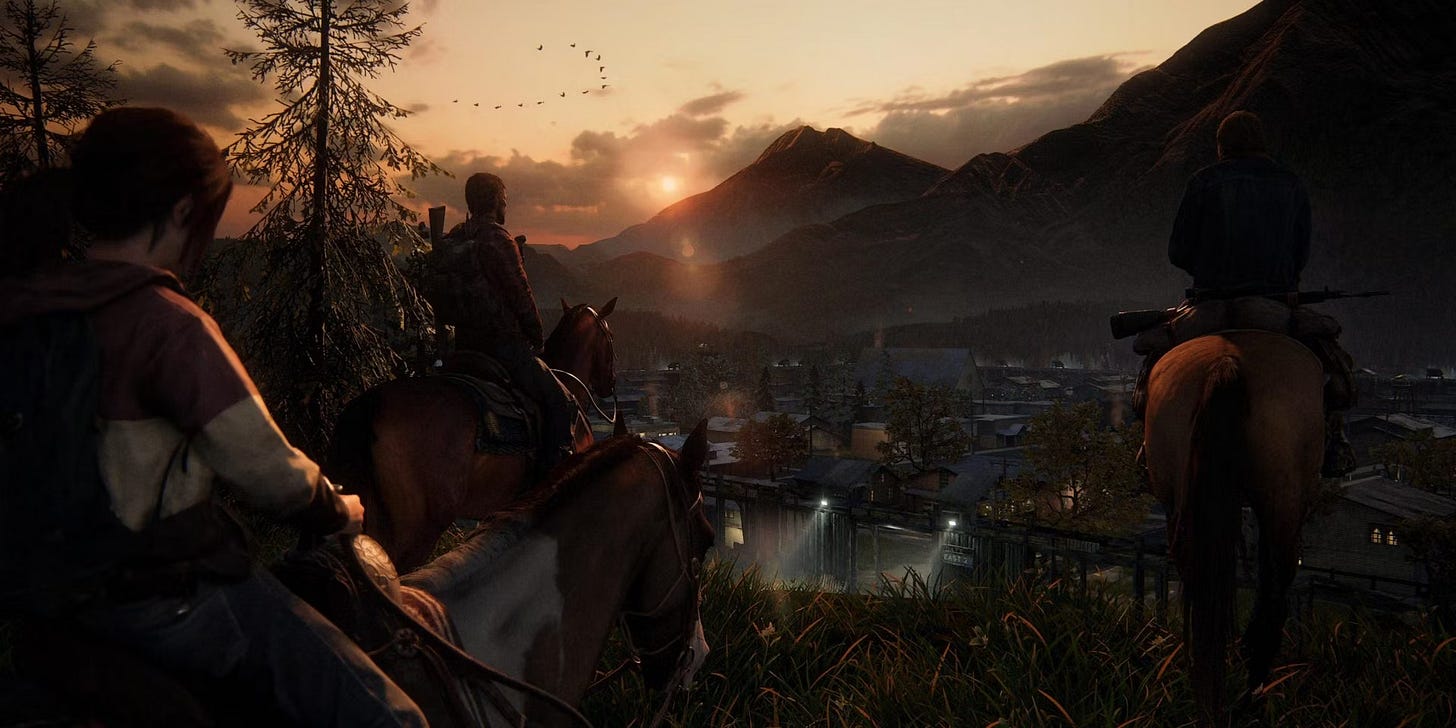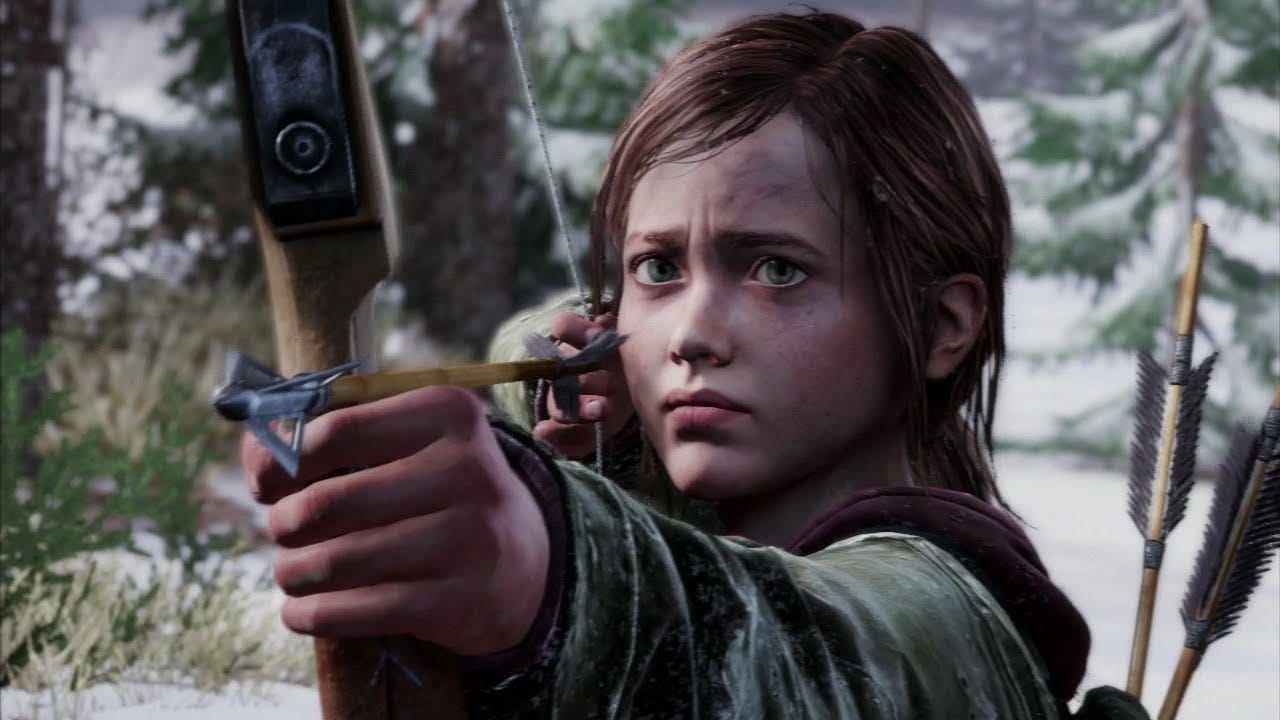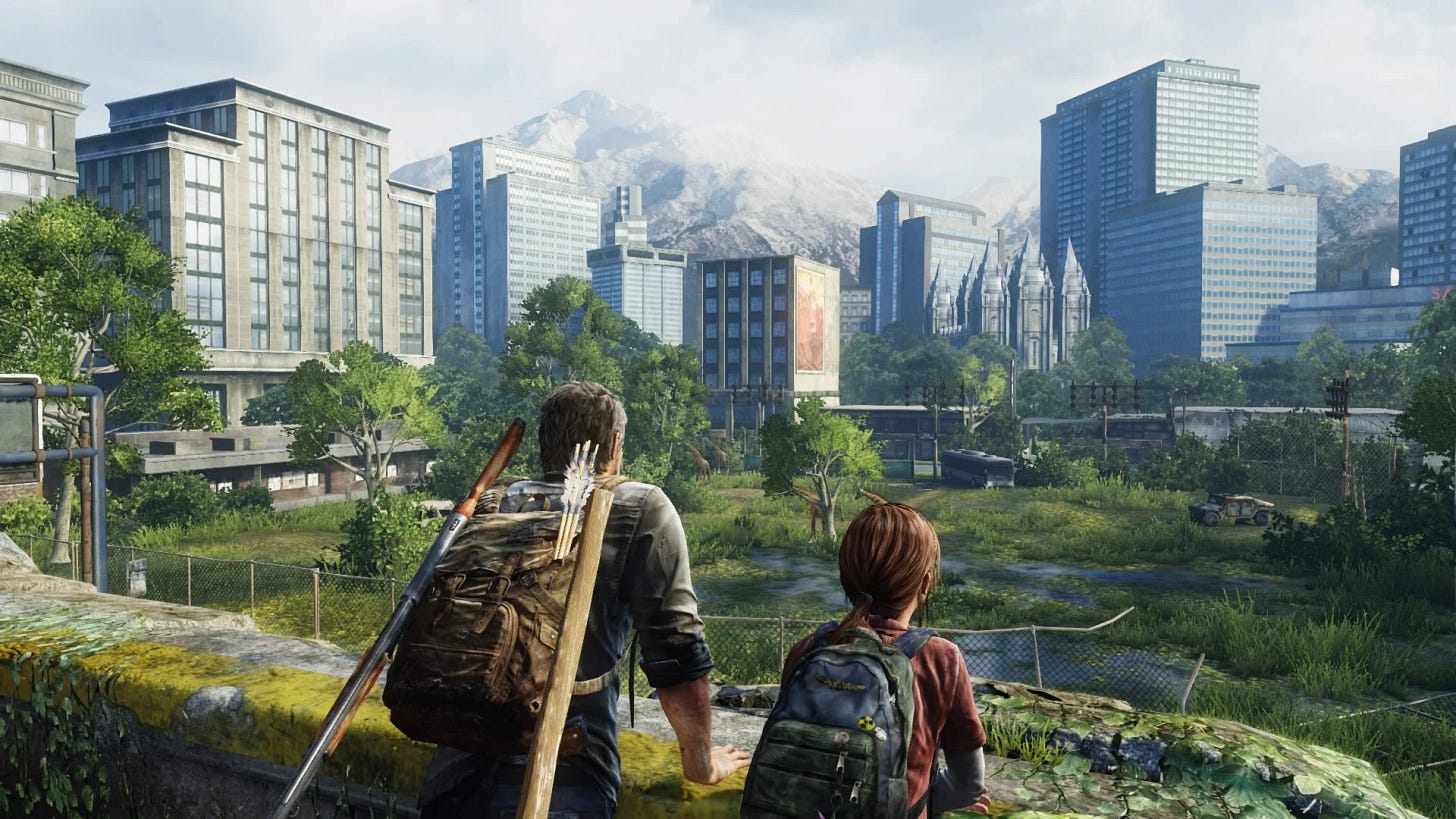Now a video essay on YouTube: WATCH HERE
Few pieces of media have ever struck such a chord, or had such a lasting, rhythmic impact on me like The Last Of Us has. By the numbers, it is one of the most successful video games ever made. Over 20 million copies sold, with 1.3 million of those being within the first seven days of its release. It was nominated for 13 awards, winning 10 of them including “Best Game” and “Game Of The Year” at the Golden Joystick Awards. The graphics have been called "gorgeous" and "jaw-dropping", the characters "richly painted", the themes "poignant" and "well-drawn".
Though, the way in which this game has made its mark in the world of visual storytelling, and the way it left most of us speechless far surpasses the metrics of accolades.
It feels much deeper.
In this essay, I discuss what are, in my eyes, the core elements of the narrative. As well as how they demonstrate Joseph Campbell's Hero's Journey.
Introduction
In Victor Frankl’s book, “Man’s Search For Meaning”, about his time as a prisoner in Nazi concentration camps during World War Two, he writes:
“Everything can be taken from a man but one thing: the last of the human freedoms—to choose one’s attitude in any given set of circumstances, to choose one’s own way.”
Essentially proposing that our greatest power against any circumstance—no matter how horrific, tragic or dire, is our choice. And I would say that The Last Of Us emphasizes with blood stained, bold text the power of choice. As this story, much like Frankl’s, is about one man’s choice in the most tragic of circumstances, and how that choice not only changes his life, but also saves it.
I don’t think I’ll ever forget the first time I played The Last Of Us.
From every heart pounding close call, to every moment of connection and love, and warmth and desperation, and agony. From moments of grueling confusion—to hopeful clarity. It’s all so beautifully horrific. I can’t help but be reminded of my own world while traveling through this one. Not of hunters, clickers or bloaters, but of people. Life. Tragedy that befalls us everyday, laid out before us like a game of hopscotch: you can put one foot in front of the other, or you can put two. Either way you’re playing the game and progressing forward. You only lose when you stop moving or trip on your own impatience. But this doesn’t even begin to describe this game…
And it’s more like an experience. I mean, can you imagine the advertising for that? The Last Of Us, not just a game, an experience! It’s like yeah, Jerry, we get it. It’s not just a game, it’s an ‘experience’! Hey, Tom, get a load of free thinking Jerry over here! But it really is more of an experience, as evidenced by the moment just after the screen goes black at the end. What did you feel? What did you think about, if anything? Or were you emotionally numb? Devoid of rational thought like a broken hearted soul. Did you cry when those credits started to roll? Why?
You see, it’s more than just a game, because it does things games don’t normally do. It moves you in ways more familiar to those of cinema, or books of poetry. Novels of heroes, villains and broken people you relate to, because you feel broken. Because you feel like the villain but you aspire to be more like the hero. Well, in this story, there really isn’t much a hero or a villain. There’s nature and its many consequences played out in the lives of ordinary people. More so than human conflicts, there is a root in the horror of life as it exists twisted into something even more terrifying. But there is one human ideal at its core: the power of choice. And the price of inaction.
Superhero movies have it wrong. They portray superpowers as otherworldly. Supernatural. Things no ordinary person can do: shooting lasers out of your eyes, lifting insanely heavy objects, the ability to fly…without two middle aged, bald fatties, both wielding big buckets full of KFC chicken, blocking both your ability to move and your view out of the window. But I would say that our true human superpower is our incredible ability to choose. As Victor Frankl would put it, “choose our own way.” This supercharged ability allows us to navigate through life as we see fit. Become the person we aspire to be. And its with this power that the illusion of control becomes a little less of an illusion, and through which the travesties of life become just a bit more bearable.
Joel’s choice to take Ellie to the Fireflies, and to ultimately sacrifice a cure to save her, is his final surrender to the Hero’s Journey; the transformation that has been calling his name all along. The track that underlines this choice is titled “The Choice”, it’s a soft, melodic track that has a sense of hesitation. What I think represents Joel’s hesitation to take Ellie to the Fireflies, and his even greater hesitation to change. To move on from his past and heal from it. His refusal of the call. His redemption restores his purpose of being a father, of protecting and caring for his child. So yes, there is redemption and purpose, but it starts with pain. Brokenness. We see this in the story of Joel who is broken by the loss of Sarah, and Ellie who is broken by the loss of Riley. And the bridge between pain and redemption is choice. And that’s what this game, this experience is really about.
Part I: Pain
The Last Of Us opens with a ticking clock. Like the slow drain of sand from one side of the hourglass to the other, it is an eery reminder that time is slipping away. And that it, like the sand, is limited.
There is, nestled in the casual moment of a father coming home, a depiction of Joel and Sarah’s relationship. We see all that we need to, to know what it’s truly like in its purest form, from these few moments. But then there is a shift, a loud, intrusive noise: Sarah’s phone begins to ring. Her uncle Tommy is on the other end, barely able to string words together. He asks for Joel, but is then cut short of even explaining what’s happening. I’ve always found it strangely brilliant that we begin playing the game as Sarah. And there isn’t a loading screen, a HUD (heads up display) that appears or some indication that we are now in control. It just starts. And I’m sure many of us stood there for longer than we’d like to admit waiting for our cue. But then, maybe even by accident, we move the thumb-sticks and Sarah begins to move.
Then its like, oh… I guess this is it. But it feels so awkward. So sudden. I’m sure, though, that is by design. As we make our way through the house in search of Joel, we see subtle indications that the world is changing in ways unprecedented, unheard of, unspoken. Ways that will shape not only our experience, but also the very fabric upon which the story is sown. From the perspective of a scared child, we see little breadcrumbs of the life and love she shares with her father, and then the starkly orange hazel scorch exploding violently to surely calcine any bystanders; those whom we see on the TV. Bringing the danger to our front doorstep. It no longer feels far away, but here and now. Before innocent eyes. There isn’t a better way Naughty Dog could’ve made us feel so scared, so helpless, defenseless and small than to have us play as Sarah. They paint for us a very clear picture, through immersion in it’s canvas, of the point this is all to make: WE ARE NOT IN CONTROL.
Joel at last returns home, panicked and fear-stricken. Asking what would be a strange question outside of the broader context of events Sarah is yet oblivious to: “has anyone come in here?” A product of said events literally comes a-knock-in, a neighbor who was known and trusted, now ferociously busts through the back door and makes a dash towards Joel and Sarah. With either malicious intent, or no intent at all. His body overtaken by an unseen force. This moment is synonymous with the T. rex escape scene in Jurassic Park. Not necessarily for what is shown, but for what is represented.
There exists two worlds separated by a man-made divider. On one side, there is the world of order and normalcy. On the other, there is the world of chaos. At some point, you can’t hold back the world of chaos, at some point it pushes through. It will not be ignored or deterred. It will force you to deal with its presence, its existence. And you must choose whether or not you want to live in this new compound of the world you knew and the one you don’t; what is familiar and what is foreign. Joel answers with a gunshot.
As Tommy drives us away, we see from a familiar point-of-view, terror. Fear. Destruction. Sarah asks questions trying to better understand what can not yet be understood. Things are beginning to unfold and, this time, we do not have the bittersweet pleasure of ignorance. We have to watch, feel, experience. There is no comfort in the images flashing before our eyes, no sense of boundary. Joel, Tommy and Sarah are living this, not witnessing it from the outside looking in. They do not remain unaffected. A car crashes into Tommy’s, forcing us off what we perceived to be the path to safety. The hope of salvation. But there is no such thing left in this world. As lives are claimed by either fear or death, the lone drum of hopelessness beats. Echoed by the screams of its victims. Amongst the wreckage and the chaos, we now venture on foot as Joel, carrying an injured Sarah. This change of character introduces a change of perspective. We are no longer the scared child, but are the strong protector of her. She depends upon our speed and tenacity to sift through the crowd and find a way out. Around people dying before us, structures crumbling, through burning buildings. The world is burning. Everyone we’ve ever known or loved or hated is succumbing to the plague. Ripping apart society and the city it built with clawed fingers, slashing as it goes. Raining red. Smoke clouding the air like a heavy perfume made from death. Brick becoming ash in the flames. These flames will either be a refiner’s fire, or the flames of hell: refining who we are, or destroying who we are.
When all seems lost, a shimmer of light breaks through the darkness. A soldier comes forth, not to bring protection or security, but to bring a sword. And those who live by it shall die by it. Tommy’s help comes too late, Sarah is mortally wounded. She bleeds in her father’s arms, laboring for every breath. Now, Joel’s world crumbles. The light goes out. Sarah is lost. And the flames have overtaken the city. And these flames will either be a refiner’s fire or the flames of hell: refining who we are, or destroying who we are.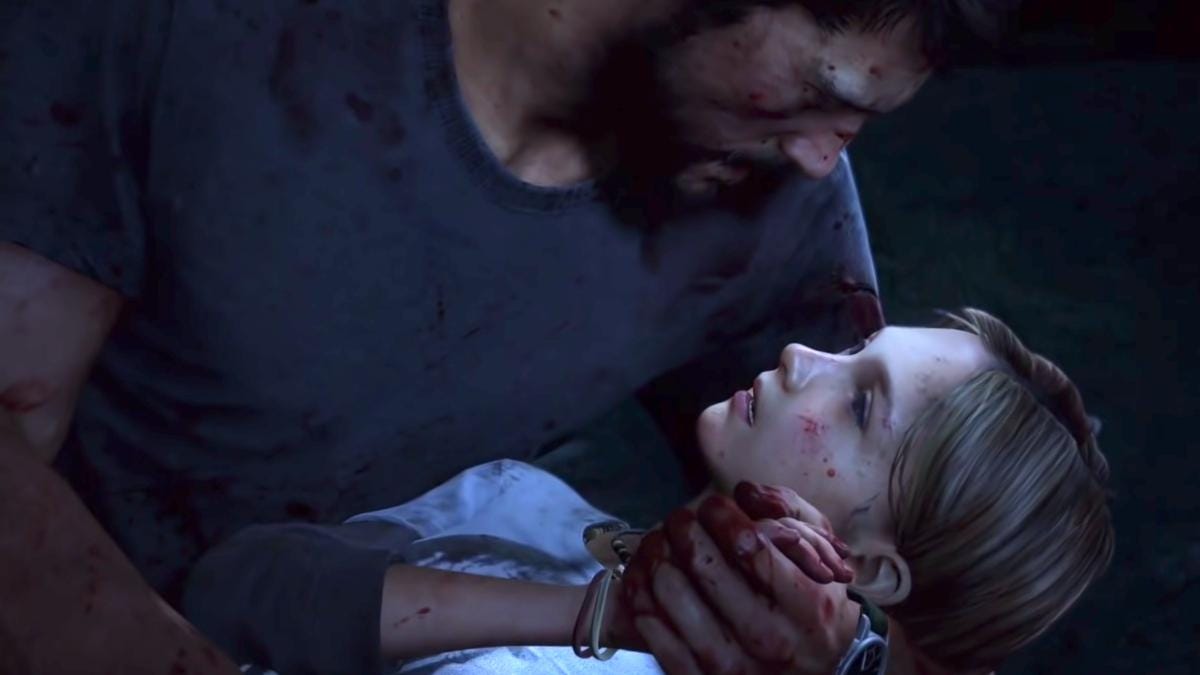
Part II: The Call
Twenty years later, what’s left of Joel is buried in sorrow, pain, regret. Piles and piles of fear and hurt have built a wall around him.
This is where I see his story really begin to exhibit the Hero’s Journey, as outlined in Joseph Campbell’s book “The Hero With A Thousand Faces”. Where the loss of Sarah was a catalyst for his downfall, the introduction of Ellie is a catalyst for his redemption. To understand why he would initially refuse the call, we first have to place it in the proper context. Joel ended up meeting Tess at some point over the last twenty years. He left Texas and moved to Boston, where the two now reside in a Quarantine Zone. With the collapse of society came the dismantling of the United States government. The shreds that still exist attempt to execute martial law, desperately trying to maintain order. Though, in their desperation, they overstep the boundary between keeping the peace and creating an authoritarian regime that shoots people in the streets. You get the sense that most of the soldiers don’t care about the citizens. That they are indifferent to the way things are, the way they have to be. In the end, it doesn’t feel much safer inside the walls than it does outside of them. This surviving cell of military forces is actively at war with a splinter group called “The Fireflies.” Whose message is, “When you’re lost in the darkness, look for the light”, hence their name. And their vision is to restore society. They basically feel as though, by any means necessary, it is worth sacrificing the lives of many to see their vision fulfilled. As it turns out, Joel’s brother, Tommy, once belonged to this group. But has since left not only the Fireflies, but also Joel. His last surviving family member left him.
But there’s an even darker truth about Joel: he was once a Hunter. Someone who would hunt human beings, trapping them or tricking them into stopping thinking he was hurt. At some point, Tommy couldn’t be a part of that anymore. He was promised hope and salvation by Marlene, the leader of the Fireflies. And that’s what ultimately untied the knot between he and Joel, and led to Tommy’s departure. A series of events I’m sure Joel resents Marlene for at least at some level.
Joel and Tess are now smugglers in the Quarantine Zone. They profit from illegally selling and transporting goods in and out of the city. Guns, pills, food. And Joel has built a life out of this. But, like his life as a Hunter, it’s not one that aligns with who he is at his core. It’s not one that will lead to confronting his past, his pain, his hurt, and healing them. Comfort and complacency will only allow these things to remain unchallenged. It takes adversity to change. Confronting the past, challenging your fears, and growing as a person isn’t a process of comfort nor convenience. It’s uncomfortable. Miserable at times. It takes stepping outside of your comfort zone. But it’s all necessary for our growth and healing. As unintuitive as it might sound, we heal through pain. We grow stronger through stress. Think of building muscle at the gym. Lifting weights breaks down your muscle so that it may become bigger and more capable of the workouts you engage in. It’s the same concept when it comes to personal growth and building strength and emotional resilience. Struggles, however unpleasant and uncomfortable they may be are necessary parts of our journey to become the best possible versions of ourselves. But Joel hunkers down in this life of relative safety, and builds a routine of life. Refusal of the call to this journey of struggle and confrontation of what has for too long laid dormant, is often due to a character fearing some part of himself that holds him hostage, or some part of his past that haunts him. He may build a house in which to take refuge, but as Joseph Campbell puts it:
“Whatever house he builds will be a house of death: a labyrinth of cyclopean walls to hide from his minotaur. […] All he can do is create new problems for himself and await the gradual approach of his disintegration.”
An almost perfect description of the Quarantine Zone, which had become a castle of normalcy, but also a palace of suffering. Creating new problems for Joel to confront, all the while neglecting to confront what is really wrong, his real problems. These are the walls he hides from his minotaur behind. The minotaur in this case not being a half man, half bull creature like in mythology. But a representation of the outside world, the journey that awaits him and the call to that journey of uncomfortable healing, that offers him redemption. He can easily waste away in this smuggler life, dying from either infection or old age, nestled still in the pain and loss he never fully recovered from. But the quest to bring Ellie to the Fireflies offers him a chance at something else.
He almost certainly feels a sting when he meets Ellie, and especially when he becomes her guide and protector. She reminds him of what he lost with every quirky mannerism, every innocent inquisition, every attempt to break the ice or in any way grow closer. It doesn’t take long for Tess to take notice of this. And it definitely doesn’t take long for Joel to refuse the call.
Part III: Beyond The Threshold
Crossing the first threshold is a step along the Hero’s Journey that takes our characters from the world of normalcy to one of the unknown. Think Frodo and Sam leaving the Shire in The Lord Of The Rings, or Luke leaving Tatooine in Star Wars. Taking this step can be summed up by Obi-Wan:
“You’ve taken your first step into a larger world.”
- Obi-Wan Kenobi to Luke Skywalker, Star Wars: Episode IV - A New Hope (1977)
Once our hero has crossed the first threshold, there is no coming back. Even if after the journey he returns to the location, he will not be the same, nor look at the location through the same lens. He will have changed, even if the place hasn’t. Crossing the first threshold in the story of The Last Of Us could be seen as when we leave the Quarantine Zone with Tess through the tunnels below. But I see it as when we leave the safe house with Tess and Ellie. This moment, rain splashing against the window as we look out into darkness, the lights of soldiers scouring for stragglers lit up from afar, has such a feeling of perpetual dread. At first step, beyond the threshold, there’s a sigh of relief, a breath of fresh air. Until we are reminded of the unpredictable chaos that awaits us around every corner.
The reveal of Ellie’s immunity has profound and deeply complex implications, in both the biological sense and the philosophical one. If Ellie is truly immune, then the Firefly’s pursuing a vaccine using her mutation is nothing short of amazing grace. Yet, it is with great hesitation and understandable caution that our characters will navigate this possibility, especially regarding the sacrifice it will take to achieve it. On one hand, the idea of immunity to such a horrific and widespread disease comes off as pseudoscientific at best, pure myth at worst. But on the other, more forgiving hand, the idea of saving humanity and doing one’s part to accomplish this is something not so easily brushed aside. At least, not by Tess. Joel’s hesitation is not entirely due to the outrageousness of the claim Ellie has made about her immunity, but rather spawning from the inner conflict he faces.
A lot of times, we see the choices of others either through a biased lens, or one of pure ignorance. In essence, we don’t know what someone is truly going through, though we tend to treat them as though we do. We engage with them as if there’s no secret they could possibly hide from us: a stranger, a passerby with absolutely zero conclusive or meaningful insight into who they are and what they have to deal with day in and day out. Inner conflicts are as real, potent and damaging as any other affliction we face as people, yet it’s also the hardest to see. No microscope can detect it, no test can screen for it. And even if it’s recognized, it’s extremely difficult to know what to do with it in ever day interaction. In other words, our own inner dilemma’s don’t generally mix well with that of other people. Especially when that conflict is attached at the root of who we are. Any tugging or pulling, desperate tries by others to rid us of it, will only further cripple our ability to face it ourselves. Or so our anxiety often whispers. We scream in fear that it will damage us to a point beyond repair. A place where we are no longer welcomed amongst our own family, are estranged from our own friends, and where we may become unrecognizable to them. And that’s the worst place one could possibly find themselves emotionally. Despite social anxiety and harsh words that may have been shot our way by even the most trusted and loved people in our lives, the helping hand of someone else still remains our best comfort even if it’s not supportive, and our best support even if it’s not comfortable.
Through runners, clickers; traversing the torn landscape Boston has become, we at last reach the capital building. But there is no salvation waiting for us there, only death. Tess reveals that she is infected, now already fading into the blackness of the disease. Even though Ellie’s immunity was a far cry from dull, Tess’s reveal feels far more sharp in our gut. Like a blade of grief. Tess is lost. But with Ellie, there’s hope. She chooses to lay down her life, whatever of it she has left, so that the hope of Ellie can live on and hopefully be actualized.
Once he realizes that Ellie isn’t lying about her immunity, or horribly mistaken. He knows that the greatest injustice he can do to Tess and her sacrifice is to give up and abandon the mission. The way to honor her and ensure she didn’t die for nothing is to press on. Hold the line, stay the course and get Ellie to the Fireflies.
Bill’s town is rife with infected and traps planted to keep people away and contain the infected already present. We don’t find Bill, he finds us. His assistance becomes the difference between survival and annihilation. This step in the journey feels like the “supernatural aid” part. Although Bill is far from ‘magical’, he does provide several artifacts that aid us in our journey: a shotgun, nail bombs, a car. And he creates sort of a ‘common enemy’, or in other words places Joel and Ellie on the same side. As Joel shields Ellie from Bill and further cements himself as her protector. Bill forces Joel to reflect on the situation more so than he had probably been able to at any point since Tess departed. And also forces him to reflect on why exactly he presses on, why he remains constant in the mission to bring Ellie to the Fireflies. I believe this self inquiry and taking a step back to look at the big picture of things unlocked a lot of what Joel hid away for so long; for years now I’m sure, there hasn’t been a ‘why’. The pursuit of survival didn’t leave room for it. It’s always been ‘what’ and ‘how’: what are we going to do for food? How are we going to stay alive? Disregarding out of pure necessity the question of ‘why are we going to stay alive?’ ‘Why are we doing the things we are?’
As Bill sets us on our way, Joel and Ellie ride off into the sunset. A storm approaching, thunder softly rolling from the horizon. And we see the dynamic between Joel and Ellie really begin to shift. The banter here is much more lighthearted, tender and at a stronger caliber of normalcy. What really shows how far Joel’s disposition towards Ellie has swung towards acceptance is when he realizes she’s looking at an inappropriate magazine. If he really didn’t care, he surely wouldn’t bother mentioning anything about how that magazine isn’t for kids. It just doesn’t fit. With one glance and the tunes of a cassette tape rattling on, Joel lets us know that he sees Ellie differently. Now, she’s special.
The path forward is barricaded by yet another force. Perhaps through some cosmic justice, Hunters attack and destroy the car that was meant to take us to Tommy’s. Through this trial, allegiance and resolve will be tested once more. Only now, Joel has to trust Ellie with his life. In all actuality, he had at least in part been doing that all along in a world such as this. But this time it’s more meaningful, it’s a deliberate choice. To give Ellie a gun when he had before been reluctant, move within the line of sight, rely on her precision, discernment and timing to avoid succumbing to the Hunters’ onslaught. This is a huge leap in their relationship. Overcoming this sees a whole new dynamic: they are now on even terms. One to watch the other’s back and be responsible for the consequences thereof. Sam and Henry only solidify this dynamic as optimal for outlasting the many forces that come against them. And through the eyes of Sam, Ellie is painted with a very different brush. He sees her as fearless. He aspires to be more like her. She comes to him when he’s alone, separated from the others. Her light shines brightest in the darkness of fear, anger and despair. We gain insight into who Ellie is as a person as she reveals an innermost fear that has perhaps haunted her steps like a shadow this entire time: “Scorpions are pretty creepy. Um… being by myself. I’m scared of ending up alone.” It’s with this new insight that we can more properly frame the relationship between Joel and Ellie, and the friction between them. Perhaps Joel also feared ending up alone, and that fear was realized with Sarah’s death, reincarnated in Tess’s. And now, as fortunate and redemptive as Ellie’s crossing of his path may seem, to him it might look like another chance for his fear to be realized all over again; an encore of the worst moments of his life.
Sam and Henry are sort of a reflection of Joel and Ellie in my eyes. They have their differences of course, Sam and Henry are actually related and they have their own goals and means of obtaining them. But to me, they represent what could’ve been for Joel. It could’ve been Joel putting down an infected Sarah or even ending his own life after her passing in the way it actually played out. Henry is a reminder of why we press on: the hope to find his people and join a cause he feels a calling to. Relishing in even the thoughts of one’s loves and passions, what makes them happy. Even if it’s the dream to one day ride a motorcycle cross country or even just around the block. While Sam is a warning sign of hopelessness, a spoken word of gratitude as one must look no further than to be taught that this world is unforgiving. That the infection holds no special place for our children in its heart. It only knows to grow, strangle, consume. Sam reminds Joel and Ellie that every day is a gift, every escape from the clutches of death is something to be grateful for. As it could’ve been them, one killing the other and then themselves. Sam and Henry bared that fate, while Joel and Ellie get to continue on towards their goals, their ambitions, their mission. But the day may come when they are Sam and Henry. When their mission ends.
Sam says something to Ellie that, to me, begs a far grander question than anything else posed by the story. That sort of reshapes my perception of the entire world of The Last Of Us: “Those things out there. What if the people are still inside? What if they’re trapped in there, without any control over their body?”
An interesting theme discussed early on in The Walking Dead TV show is if the walkers were still who they used to be somewhere in their brain. A CDC doctor walks them through the neural imaging of an infection and ultimate reanimation. Showing that only the brain stem is reactivated. This means that only motor functions are restored among other primitive impulses, the upper segments of the brain that carry personality, reasoning, logic, language, empathy, emotion all remain offline. If you’ve ever heard of the three brain model, or Triune brain model introduced by neuroscientist Paul Maclean in the 1960s, later expanded upon in his 1990 book “The Triune Brain In Evolution”, also by Carl Sagan’s 1977 book “The Dragons Of Eden”, this really becomes handy to look deeper into the infected as people. In Maclean’s three brain model, the first segment is the basal ganglia, named our reptilian brain. As we share this primitive structure with reptiles, or more importantly our reptile-like evolutionary ancestors. It allows us to move our limbs, turn our head, you know…contract muscles and have very primal impulses. Whereas our paleomammilian brain is derived from older mammals, evolutionarily older mammals, and contains our amygdala, hippocampus, hypothalamus and septum. This gives us emotion, attachment, memory, a broader sense of sexuality and more attached parental behaviors among other things. Finally, our neomammilian brain, thought to be most unique to us, containing our big beautiful, human neocortex, and is (fun fact) the biggest in homosapiens than in any other mammal. Housing our elegant prefrontal cortex, which is unique to humans and some other primates, theorized to be what gives us our highest level of cognition, language and reasoning far beyond any other species.
And of course all of this is a way oversimplified comparative neuroanatomical model. But it can still serve a purpose. I don’t say all of this just because I’m sort of a nerd and love to talk about science and philosophy, I bring this up to provide a point of reference to demonstrate the theme of infection in The Last Of Us. If the brain stem is truly all that remains active, then the walkers are merely empty vessels tasked to carry out means to the disease’s end. But the Cordyceps infection is a bit different. For one, we don’t have the luxurious insight of realtime neural imaging, so we don’t truly know exactly how the brain is affected by the fungus. We do, however, know that the Cordyceps fungus grows all over the brain, and that’s how it ultimately takes over its host. Some of the first protruding growths in the early stages of the infection come out of the head. What a horrifying thought of all the infected you’ve killed, that maybe those were still people inside. Maybe you take on the mindset of Hershel from The Walking Dead: that the infected are just sick people and that they have the capacity to be healed, brought back from their walking corpse state. Or worse yet, the thought that the infection would take over someone’s mind but allow consciousness to continue. To where the person is basically trapped inside of their body, tortured by the loss of control, forced to watch as they rip apart innocent people. We’ll come back to this theme in a bit, as it’s very pertinent to the concept of choice.
Part IV: The Choice
The relationship between Joel and Tommy is mended. But, in this relationship, Joel seeks shelter from the daring feat of facing his past. Even when Tommy all but shoves it in his face, Joel only wants to shove it aside. He asks Tommy to take Ellie to the fireflies, but somewhere in his mind, he knows that this is coming from a place of fear. Not a place of genuine concern for Ellie, he’s managed to keep her safe all this time. He’s fully capable, and Ellie is a fighter in her own right. She sees right through this attempt to run away. Desperately trying to convince him not to go. Or if he decides to, to at least be honest about why. She won’t let him hide away, which is why I think he tries to get Tommy to finish the mission. Through her, Joel is forced to confront his past, and contemplate his future. Is this the man he wants to be forever? Is it possible to be something else? Can Jackson provide stability and allow him to nurture a real relationship?
Overlooking the city of Jackson, Joel can see that there is perhaps hope for mankind. A future worth fighting for. At the last minute, he decides that he wants to become a different sort of man; one more akin to who he was before he lost Sarah. He throws aside his fear and decides to take Ellie to the Fireflies.
The university lab is abandoned, but Joel and Ellie find out where to go. Just before being shot at by a group of Hunters. Joel is badly wounded and Ellie must get him to safety, fighting through more than her fair share. Holding her own better than anyone could’ve expected from a fourteen year old. In the winter, she meets David, the leader of the Hunters. He tries to make the case that he and his men are no different than Joel and Ellie, but Ellie remarks that they only kill because they had no choice. David then suggests that he and his men don’t either. And that killing is necessary to survive. This brings us back to the concept of choice. Infected are seen as mindless, in the sense of a human mind. They are, in fact, brought to life by something other than human spirit; brought back from the chasm of death to feed on the world set before them. If I were to take a guess, I’d say that this is how many victims of vicious, wild animal attacks view wild animals. They are ‘other’, alive and frothing at the mouth by means of something other than human spirit. One could even view serial killers this way, and cannibals like David and his Hunters. They don’t seem to possess the same qualities that we would deem ‘good’ or ‘righteous’. But if we take a step back and look at humanity as an animal, we see the horrifying evolutionary truth: that we are survivors by nature, the same as vicious wild animals that would terrorize a bigger prey. Our most potent and driving instinct is shared with that of the rest of the animal kingdom: survival. It is only through choice that we can rise above our primitive older brains and find a new way to do things. Build a society unlike anything the world had ever seen before us.
Choice is sort of a luxury, in that amidst severe famine and a lack of cooperative supply of some of the most crucial necessities, our choice becomes a binary: live or die. We lose the philosophy, the luxury of moral systems, even if we attempt to hold onto our sense of righteousness, we fade either into darkness or death. There is a point, I think, in which there is no way to live righteously. A world that could turn sour to the point where, like milk that is no longer drinkable, we see nothing but people who are no longer good. For the ones who tried to be good in such a world were soon flushed out by it. The world of The Last Of Us is very close to one soured beyond the point of moral systems. In some places, it may already be the case. As we encounter more and more people, we see how the apocalypse has shaped them. David is convinced that what he is doing must be done for the survival of his people. Ellie looks upon him as if he were the devil, when he really is just a desperate animal trying to stay alive. Though, he still possesses the means to choose differently. Jackson shows us that the world has not soured beyond the point of morality, beyond the development of cooperative societies. So, David doesn’t get to say that he has no choice. Because he does. Ellie is living proof of that. He lives in a place with game to hunt, people to cooperate with, other ways to survive other than cannibalism. Places like Jackson are trying to hold humanity up from the brink of social collapse. They are the future. The hope of humanity. Whereas the Fireflies see the hope of humanity as the cure to the Cordyceps infection. And the sacrifice of Ellie as a necessity to that end. But Joel sees Ellie’s light in the darkness. Her existence is more than enough, he doesn’t require her death. He fights for her life, by choice.
Joel has opened himself up to a metamorphosis, he is no longer the same man who fled Boston. Or even the one who lost Sarah, he has shed it all and become the man who saves Ellie. The man who won’t let his need for survival be the driving force behind his actions, instead letting his love be that captain. Though survival is always ultimately at the root, there are many more layers between delaying our demise and how we can choose to live our lives. The purpose we can instill within ourselves. The people we can choose to be. Even in survival situations, like Tommy, Joel and Sarah— we can choose what kind of survivors we’re going to be, how we’re going to survive. And just how much we are willing to sacrifice before we say enough. I would say that choice is the liberating thing. Like Viktor Frankl stresses, there is only one human freedom that withstands everything life throws at us. That is our ability to choose our own attitudes, our own actions and outlooks. To become the people we want to be. It takes Joel awhile to figure out that he too still has a choice, when he does the real Joel lives again as the Joel of yesterday is washed away. This is an ability we have as well. Stories just remind us.
In choice we find purpose, in purpose we find redemption. The chains of tribalism, fight-or-flight mentality and self suppression begin to fade. As the wounds of brokenness and loss begin to heal. We then realize that we can move on, that we can get past this. That there is life on the other side of our pain. And that through the daunting forest of fear lays a green pasture, blooming with new life. And if we could only take hold of that life, we can breathe the free air of hope. Sometimes all it takes is for someone to come along and show us the meaning of love, the warmth of embrace and the true spirit of courage. So that we may find that courage within ourselves and remember who we are.
Notes: It’s important to note that this was originally written four-to-five years ago, specifically as a video essay script for a YouTube video. It was rewritten about two years ago, and the video was remade as well. There are grammatical errors spread throughout, I did my best to clean it up, as again it was not originally written to be read by anyone but me for voiceover. So, please do your best to excuse those errors. I hope despite them, you are still able to enjoy this post as a written piece. I want to post other video essay scripts as written posts in the future, I will try to be more mindful of that when writing them, so that as little clean-up as possible is required. Accompanying visuals, in the form of pictures, were put into place in lieu of video footage the writing was originally intended to accompany. I hope that helps as well. Thank you for reading!
References:
"Man's Search For Meaning" By Viktor E. Frankl
https://www.amazon.com/Mans-Search-Meaning-Viktor-Frankl-ebook/dp/B009U9S6FI
"The Hero With A Thousand Faces" By Joseph Campbell
https://play.google.com/store/books/details/Joseph_Campbell_The_Hero_with_a_Thousand_Faces?id=iagSEAAAQBAJ
"The Triune Brain In Evolution" By Paul D. MacLean
https://www.amazon.com/Triune-Brain-Evolution-Paleocerebral-Functions/dp/0306431688
"The Dragons Of Eden" By Carl Sagan
https://www.amazon.com/Dragons-Eden-Speculations-Evolution-Intelligence/dp/0345346297
Further Reading & Citations:
https://www.thescienceofpsychotherapy.com/the-triune-brain/
https://www.ncbi.nlm.nih.gov/pmc/articles/PMC3505872/
https://thebrainscientist.com/2018/04/11/you-dont-have-a-lizard-brain/
https://www.science.org/doi/10.1126/science.377485
https://www.sfn.org/-/media/SfN/Documents/TheHistoryofNeuroscience/Volume-2/c9.pdf
https://medicine.yale.edu/news/yale-medicine-magazine/article/a-theory-abandoned-but-still-compelling/

